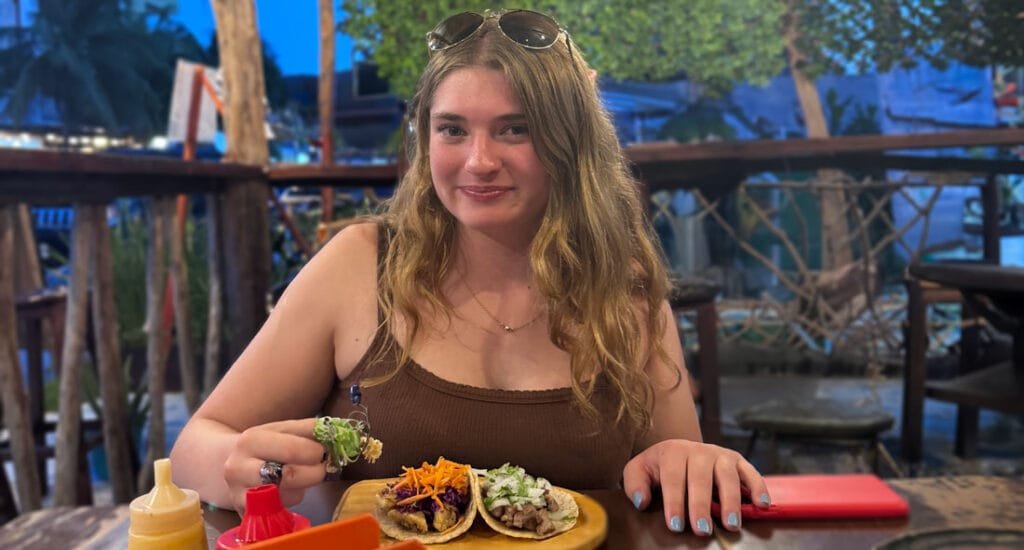
Observations of a budding marine biologist
Observations of a budding marine biologist https://www.globalclimatefinanceaccelerator.com/wp-content/uploads/2024/08/nicole-new-1024x550.jpg 1024 550 Global Climate Finance Accelerator Global Climate Finance Accelerator https://www.globalclimatefinanceaccelerator.com/wp-content/uploads/2024/08/nicole-new-1024x550.jpgDrawn to the ocean at a very early age, I spent my childhood passionately studying aquatic life, hoping one day to pursue a career in marine biology. Upon approaching my final year of high school, I decided I would greatly benefit from a taste of real experience in the field. I was incredibly honoured with the opportunity to spend two weeks in Puerto Morelos, Mexico as an inaugural member of the Global Climate Finance Accelerator’s Youth Accelerator Program.
I worked alongside a handful of other teenagers, where I completed my PADI Open Water Diver certification and ventured among the captivating world beneath the sea. Through the under-18 program with GVI, I served as a volunteer working to conserve the reef system bordering the region’s coast. We were taught how to properly monitor and identify the species of coral, fish, sea turtles, and other aquatic life inhabiting the environment. We even spent a night observing grown sea turtles coming onto the beach to lay their eggs, where eventually the hatchlings would emerge and make the dangerous—though obligatory—trek across the sand to reach the sea.
Following my first few underwater dives, I am brimming with a deeper understanding of how vital coral reefs are to the natural environment, as well as just how threatened the reef population is. In addition to providing habitation for a multitude of marine organisms and preventing coastal erosion (since the waves break farther from the shore), reefs are a common source of food and medicine for people across the globe. They also support local businesses based on diving and snorkelling. In Puerto Morelos, for example, the tourism and fishing industries are the top economic driver; as a result, reefs play a key role in allowing the economy to thrive.
There are a variety of human-driven factors endangering coral, including pollution, overfishing, and climate change, along with related diseases, tropical storms, and sedimentation. Coral typically thrives in water temperatures ranging from 20°C (68°F) to 29°C (84°F). Rapidly increasing sea temperatures, therefore, pose a significant threat to the reef system. In areas such as the Caribbean coast, where storms and hurricanes are a frequent occurrence, reefs are even more susceptible to damage. To illustrate, Hurricane Beryl hit Puerto Morelos hard a few weeks prior to my arrival, leading to an increase in broken coral and destroyed colonies. The aftermath of the storm was visible to me in my dives.
How can we get people living far away from the evidence of climate change to care about the impacts? People inhabiting our earth need coral. We need coral. Whether it is a local dive instructor providing for their family, fishers supporting their small businesses, or a city-dwelling patient treating an inflammatory illness, these marine invertebrates are a necessary part of our global ecosystem. More resources are needed to increase awareness about the threat to global marine life, and to educate others on what that means.
More to come next week on how we can help. Meanwhile, check out some of my photos and videos on Instagram @globaclimfin.
Nicole Zavagno is going into her final year of high school in Toronto, after which she aspires to study marine biology at one of Canada’s coastal universities. She got hooked on the subject after seeing “The Dolphin Tale” at four years old and has never wavered since. At age 10 she had the dream-come-true opportunity to spend a week observing and learning about dolphins at Clearwater Marine Aquarium in Florida. Nicole is a PADI open water certified diver and training to be a lifeguard. She is a former provincial-level gymnast and current coach with Toronto Gymnastics International.
